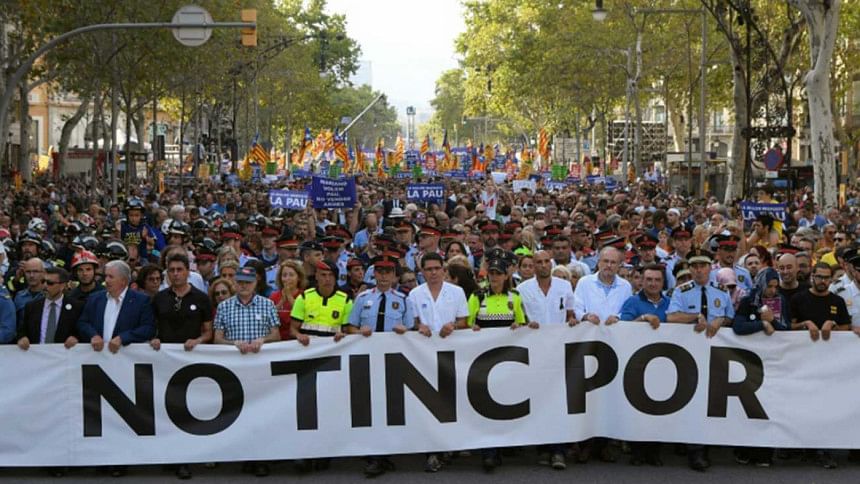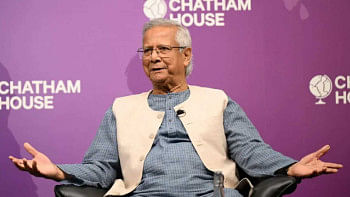'Not afraid': Defiant Barcelona marches against terror

Tens of thousands of people marched through the heart of Barcelona on Saturday in a defiant display of unity against terrorism, joined by Spain's King Felipe VI -- who nonetheless was the target of jeers by Catalan separatists.
Hundreds of thousands march in Barcelona to show unity after Islamist attacks https://t.co/wXwEhLSUGc pic.twitter.com/JtpcYCKGHS
— Reuters Top News (@Reuters) August 26, 2017
People who tended the victims of the attack were given pride of place at the front of the procession behind a large white- and-black banner that read "No tinc por" -- Catalan for "I'm not afraid".
They included uniformed police officers, doctors in their white coats, firefighters wearing their helmets and residents and shop owners who rushed to help after a van struck people on the Las Ramblas boulevard, as well as taxi drivers who transported people free.
"There were very difficult moments," said Montse Rovira, the city hall's head of social emergencies, who helped people who were lost or who could not find their loved ones.
"No to Islamophobia" and "The best response: Peace" were among the signs on display.
Marchers carried red, yellow and white flowers -- the colours of Barcelona -- as they made their way along the city's main boulevard, the Paseo de Gracia.
Many also waved the red-and-yellow Catalan flag, marked with a white star, a reminder of the simmering tensions between Spain's central government and the regional separatist government of Catalonia.
Out
The Mediterranean city has been in mourning after a driver ploughed into crowds on Las Ramblas on August 17, followed hours later by a car attack in the seaside resort town of Cambrils.
Fifteen were killed in the carnage, and Spanish Prime Minister Mariano Rajoy had called on Spaniards to turn out in force to show their "love" and solidarity with Catalonia.
King Felipe VI marched alongside Prime Minister Mariano Rajoy and representatives of all of Spain's major political parties behind the first ranks.
He is the first Spanish sovereign to take part in a demonstration since the monarchy was re-established in 1975 after the death of dictator General Francisco Franco.
But both the king and Rajoy were jeered as they arrived at the march by Catalan separatists, who reject the monarchy and hope to set up an independent republic.
Some protesters whistled and shouted "Out" at the king. He was also loudly heckled when his image appeared on giant TV screens set up along the march route.
The king and other representatives of the Spanish state were accused by some demonstrators of hypocrisy for joining the march against terror, as they have backed arms sales to countries like Saudi Arabia which some experts blame for spawning jihadists.
"The solution to the problem of terrorism is not more metallic walls or more police, but cutting financing to the Islamic State groups," said Josep-Anton Montfort, a 64-year-old retired translator, referring to the group that claimed responsibility for the attacks.
Tearful unity
Saray Gomez, an 18-year-old who works at a flower stall right next to where the van ended its murderous rampage, said it was important "to give a message of unity and peace."
"And it's important to distinguish between Islam and jihadists, because Muslims are the first to be affected."
Many people wiped away tears while listening to two cellists played "Cant dels ocells" (Song of the birds), a traditional Catalan melody, at the Plaza de Catalunya near the Ramblas at the end of the march.
It was famously played by the cellist Pau (Pablo) Casals, an outspoken opponent of the Franco regime, at the White House in 1961.
Small rallies called at the last minute were also held in cities around Spain, including Madrid, Valencia, Vigo and Ripoll, which was home to most of the suspected terrorists involved in the attacks.
In a speech delivered between sobs at the rally in Ripoll and broadcast by Catalan television, Hafida Oukabir, the sister of one of the attackers who was shot dead by police, urged people to "reject the Islamist message", calling it "a perverse ideology that has no reason or explanation."

 For all latest news, follow The Daily Star's Google News channel.
For all latest news, follow The Daily Star's Google News channel. 





Comments